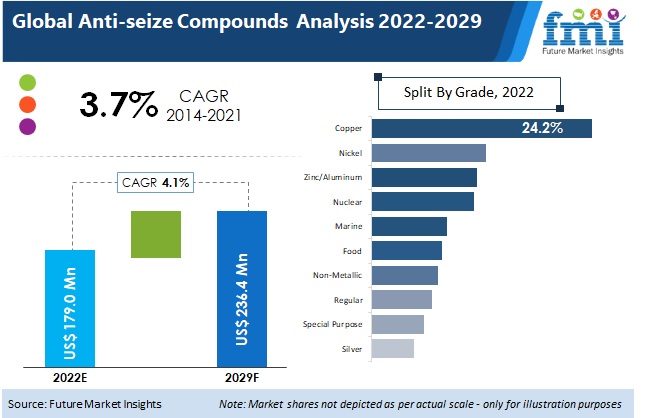According to the latest report by FMI, the global anti-seize compounds market is expected to reach a valuation of US$ 236 Mn by 2029.
| Anti-seize Compounds Value (2021A) | US$ 171.9 Mn |
| Anti-seize Compounds Value (2022E) | US$ 179.0 Mn |
| Anti-seize Compounds Value (2029F) | US$ 236.4 Mn |
| Value CAGR (2022-2029) | 4.1% |
| Collective Value Share: Top 3 Countries (2021A) | 45.9% |
Substantial growth in the anti-seize compounds market is mainly backed by the growth of the automotive & transportation industry, which holds a prominent share in the consumption of anti-seize compounds, closely followed by the petrochemical sector. Increasing urbanization and rapid industrialization are creating massive opportunities for the construction industry, and significantly contributing to the rising demand for anti-seize compounds.
“In most end-use industries, galling or seizing can increase maintenance time, resulting in longer shutdowns or closure. Increasing use of anti-seize compounds has enabled end users to reduce maintenance cost as well as time, and has simultaneously offered an efficient solution for improving gasket performance.”
Request a Sample @ https://www.futuremarketinsights.com/reports/sample/rep-gb-7203
Key Takeaways of Anti-seize Compounds Market Study
- Anti-seize compounds serve almost all major end users, including automotive & transportation, petrochemicals, mining, and others. The industrial sector in Asia Pacific is growing substantially, thereby increasing the demand for anti-seize compounds in the region.
- Copper grade anti-seize compounds find use in almost all end-use industries; hence, the segment is the most prominent amongst other grades. The nickel grade anti-seize compounds segment is anticipated to grow at a substantial rate, as these are increasingly being preferred in industries such as petrochemicals, oil exploration, and other industries where chemicals are involved, on account of nickel’s inert nature.
- East Asia is a prominent market for anti-seize compounds, and is expected to continue its dominance, owing to its strong industrial growth and high adoption of the product in the region.
- Increasing awareness about the need for protection of the environment and prevention of soil contamination has restricted the use of metallic anti-seize compounds on a global scale. Moreover, users are preferring nonmetallic anti-seize compounds over metallic ones, owing to their high cost.
Market Landscape is Fairly Fragmented
The global anti-seize lubricants market is fairly fragmented, owing to a number of players holding small shares in the market. Top ten established players account for more than one-third of the total supply. Manufacturers are focusing on strengthening their partnerships with end users and original equipment manufacturers (OEMs).
Get 30% Discount on CHRISTMAS OFFER!
Established players provide services to end users, which is an added advantage and will help them build relations for long-term supply. Key players such as Anti-Seize Technology, Henkel AG & Company, KGaA, Permatex, Inc., DuPont, Bostik, SAF-T-LOK International Corporation, FUCHS, Calumet Specialty Products Partners, 3M Company, CSW Industrials, Inc., and others are also focusing on marking their direct presence in local markets.
ANTI-SEIZE COMPOUNDS MARKET TAXONOMY
Grade
- Silver Grade
- Nickel Grade
- Food Grade
- Marine Grade
- Copper Grade
- Regular Grade
- Nuclear Grade
- Non-metallic Grade
- Zinc/Aluminum Grade
- Special Purpose Anti-seize Grade
Sales Channel
- Offline
- Online
Container Type
- Cans
- Cartridges
- Drums
- Other Containers
End Use
- Automotive & Transportation
- Construction Equipment
- Aircraft
- Mining Equipment
- Food Processing Equipment
- Marine
- Power Generation
- Oil Exploration Equipment
- Steel Foundry
- Petrochemicals
- Textile Equipment
- Others
Ask an Analyst @ https://www.futuremarketinsights.com/ask-question/rep-gb-7203
Table of Content
1. Executive Summary
1.1. Global Market Outlook
1.2. Demand Side Trends
1.3. Supply Side Trends
1.4. Analysis and Recommendations
2. Market Overview
2.1. Market Coverage / Taxonomy
2.2. Market Definition / Scope / Limitations
3. Key Market Trends
3.1. Key Trends Impacting the Market
3.2. Product Innovation / Development Trends
4. Key Success Factors
4.1. Product Adoption / Usage Analysis
4.2. Product USPs / Features
4.3. Strategic Promotional Strategies
5. Global Anti-Seize Compounds Market Demand Analysis 2014–2021 and Forecast, 2022–2029
To be continued…!
Related Links:
https://www.pearltrees.com/futurechemical/item489297024
https://tannda.net/read-blog/12453
https://theamberpost.com/post/chitosan-market-size-share-demand-trends-by-2031
https://likefm.org/blog/chitosan-market-size-share-demand-trends-by-2031
About FMI
Future Market Insights (ESOMAR certified market research organization and a member of Greater New York Chamber of Commerce) provides in-depth insights into governing factors elevating the demand in the market. It discloses opportunities that will favor the market growth in various segments on the basis of Source, Application, Sales Channel and End Use over the next 10-years.
Contact Us:
Future Market Insights Inc.
Christiana Corporate, 200 Continental Drive,
Suite 401, Newark, Delaware – 19713, USA
T: +1-845-579-5705
For Sales Enquiries: sales@futuremarketinsights.com
LinkedIn| Twitter| Blogs
